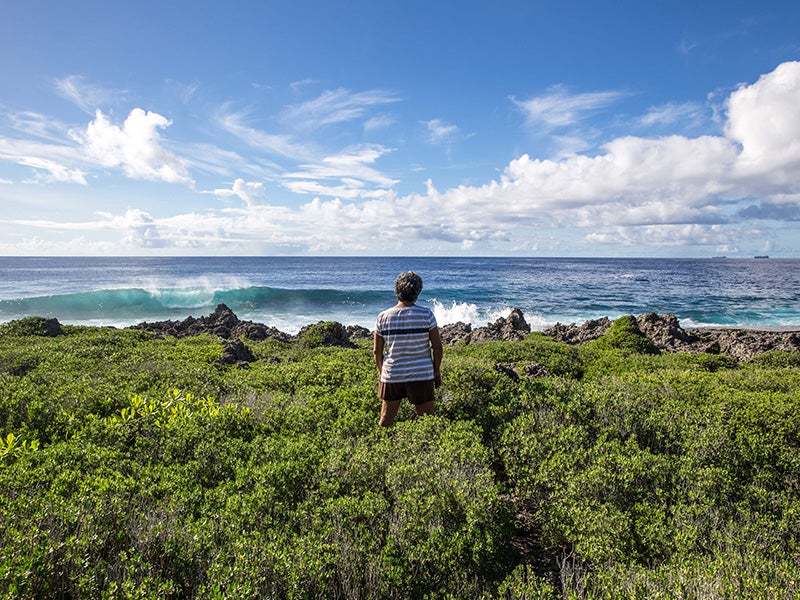Federal Judge Denies Motion To Dismiss Lawsuit Over Pågan, Tinian Training
Judge allows case to move forward to determine whether Navy considered all the impacts associated with live-fire training plans for Northern Mariana Islands
Contacts
David Henkin, Earthjustice, (808) 599-2436, ext. 6614
U.S. District Judge Ramona Manglona refused to dismiss a lawsuit challenging U.S. Navy plans for the Marine Corps to conduct live-fire training in the Commonwealth of the Northern Mariana Islands. In a decision issued today in Saipan, Judge Manglona said the lawsuit questioning whether the Navy failed to consider all the impacts associated with the plan to transfer 5,000 Marines from Okinawa to Guam and begin staging massive, live-fire war games on the islands of Pågan and Tinian can proceed.
© Mapbox © OpenStreetMap
Tinian and Pågan are two of the fifteen islands in the Commonwealth of the Northern Mariana Islands. The Northern Marianas are located just north of Guam.
Judge Manglona did dismiss a claim that the Navy should have considered alternate stationing and training locations for Marines that are relocating from Okinawa as part of an agreement with Japan.
But the lawsuit over whether the Navy violated the National Environmental Policy Act by failing to consider all of the impacts of the relocation and training in a single Environmental Impact Statement will continue.
Earthjustice—representing the Tinian Women Association, Guardians of Gani’, PåganWatch and the Center for Biological Diversity—filed the lawsuit last year.
“We are thankful the judge reaffirmed that the military is not above the law,” said David Henkin, the Earthjustice attorney leading this case. “Before deciding to move thousands of Marines to the Marianas, the Navy should have considered the devastation to Tinian and Pågan from the live-fire training those Marines will need to perform their mission. The people of Tinian and Pågan will now have their day in court to challenge this existential threat to their homelands.”
Photo courtesy of Dan Lin
No live-fire training currently takes place on Pågan, a remote island that has been largely uninhabited since a volcanic eruption in 1981 forced evacuation of the local population. Many former residents and their children would like to return to live on the island.
Tinian is a small island with a population of just over 3,000. Currently, the only live-fire training conducted there is limited to a sniper target range. No live-fire training currently takes place on Pågan, a remote island that has been largely uninhabited since a volcanic eruption in 1981 forced evacuation of the local population. Many former residents and their children would like to return to live on the island.
The training proposed for Tinian and Pågan would be intense and destructive. War games would include artillery, mortars, rockets, amphibious assaults, attack helicopters and warplanes and, on Pågan, ship-to-shore naval bombardment. The training would destroy native forests and coral reefs, kill native wildlife—including endangered species—and destroy prime farmland.
Photo courtesy of Dan Lin
The site of an ancient meeting house at Masålok. The upright stones, known as latte columns, supported the structure. This area is of cultural significance, both due to the presence of the archeological sites and because local families go there to collect traditional medicine, as well as red peppers for subsistence. Masålok lies within the Military Lease Area, and proposed training would restrict public access.
Communities on Tinian—mostly indigenous Chamorro and low-income residents—would be subjected to high-decibel noise, as well as restricted access to traditional fishing grounds, cultural sites and recreational beaches. Cultural and historic sites would be destroyed. Families evacuated from Pågan in 1981 would never be able to return, their former home turned into a militarized wasteland.
The groups represented by Earthjustice have been fighting this proposal since it was first made public in 2013.

Additional Resources
About Earthjustice
Earthjustice is the premier nonprofit environmental law organization. We wield the power of law and the strength of partnership to protect people's health, to preserve magnificent places and wildlife, to advance clean energy, and to combat climate change. We are here because the earth needs a good lawyer.
